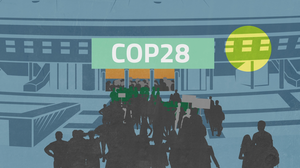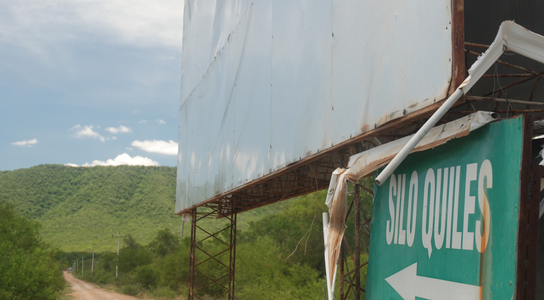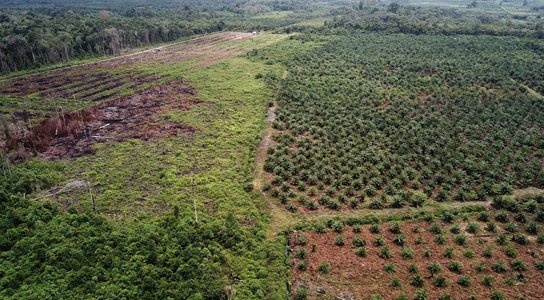The UK government has finally announced its ban on imports linked to illegal deforestation, while our win in the House of Lords earlier this year is paving the way for a new UK deforestation finance law.
With global temperatures rapidly approaching the 1.5C limit, our planet is at a crossroads.
Deforestation and forest degradation contribute to around 11% of global carbon emissions. But global deforestation rates were still rising as of last year, jeopardising the battle to limit climate change.
In the UK, we have been driving the necessary change in two key areas: making sure financial institutions can no longer fund deforesting businesses and pushing for UK commodity imports to be deforestation free. Here’s some of the wins we’ve had over the last year.
Cutting off deforestation finance at the source
The UN has been unequivocal: governments must shut off the financial lifelines keeping deforesting companies alive to reach net zero.
Now, thanks to our campaigning and the efforts of our partners, the UK Treasury are set to embark on a nine-month review to evaluate how to prevent the City of London providing billions of pounds to deforesting businesses each year.
This hard-fought win is the result of our efforts with the House of Lords, where we proposed the creation of a new law that would require financial institutions to carry out checks on their clients to ensure they are not engaged in illegal deforestation or land grabs.
The Lords felt so strongly in favour of our legal change that they voted it through - despite the government’s opposition.
The nail-biting vote was a “highlight” of the year in the House of Lords, with Labour, the Liberal Democrats, crossbenchers and an influential Conservative backbencher coming together to pass the amendment.
I see no fundamental conflict between having a vibrant, competitive, world-leading financial services sector and taking the very toughest approach on deforestation. - Minister Andrew Griffith, then-Economic Secretary to the Treasury

Behind the scenes
We began campaigning for this change to the Financial Services and Markets Act when we were called to give expert evidence to MPs in 2022.
In a series of debates, peers and MPs cited our work that shows financial institutions are failing to carry out basic due diligence - leading to devastating consequences for the planet and forest communities.
Our existing regulations are practically an open invitation to banks to launder the proceeds and profits of forest crime. Evidence from the charity Global Witness shows that, in the five-year period between the Paris COP and our own Glasgow COP, British banks and financiers made deals worth $16.6 billion, with just 20 agribusinesses implicated in these transactions. - Baroness Boycott, Crossbench peer

We know from the work of organisations such as Global Witness that, over the years, there have been far too many examples of banks knowingly, or sometimes unknowingly, financing the activities of companies that purchase directly from those who are illegally deforesting areas of the Amazon, for example, for beef production or soya production. - Chris Grayling, Conservative MP
Financial institutions worth £2.7 trillion then signed an open letter publicly supporting our proposal, with more than 200 Global Witness supporters also contacting their MP to urge them to vote it through.
Faced with this overwhelming momentum, the government was forced to reconsider its position and subsequently ordered the Treasury to review how to stop the financing of commodity-driven deforestation.
This is the first time the Treasury is holding the pen on deforestation – and we will be working hard to make sure they review all the evidence and report back to MPs on the need for a new law.
This cannot come soon enough. According to our investigations, banks like HSBC provided billions to some of the world’s worst deforesters between 2016 and 2020 – reaping eyewatering proceeds The same goes for pension funds; for every £10 the average Brit puts in their pension, £2 is linked to deforestation.
While this still review falls short of the new law we need, it remains a big opportunity, and puts the UK back in line with the EU, where regulators are also considering new laws to stop finance flowing to businesses driving forest loss and degradation.

COP28 and beyond
Currently, the world is way off track from achieving the global target to end commodity-driven deforestation by 2025.
But this year, we’ve finally seen progress when it comes to deforestation driven by imports of key UK commodities like soy and beef.
At COP26 in Glasgow, the UK brokered a landmark international agreement signed by more than 140 world leaders to halt and reverse forest loss by 2030. It also pledged £1.5 billion in forest conservation funding.
Now, after more than two years of waiting – and following immense pressure from supermarkets and NGOs – at COP28, the UK government finally announced an import ban on soy, palm oil, cocoa, beef and leather if produced on illegally deforested land.
This announcement came just a month after our research with supply chain transparency initiative Trase showed the impact of the government’s delay on the UK’s tropical deforestation footprint.
It’s vital that the law is now swiftly brought into force.
The government must then extend it to match the EU’s more powerful deforestation regulation - which covers all major commodities and all deforestation, regardless of legality.
We will also be watching closely to make sure human rights offences and land grabs are included in the UK's definition of "illegal" production. We need to protect our forests and land and environmental defenders. There is no 1.5°C without them.
Next year, we will help make sure the UK government puts its money where its mouth is on ending global deforestation for good.


